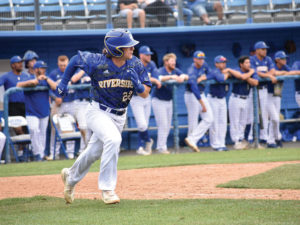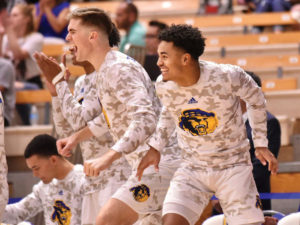
Grappling with steep budget cuts, UCR’s Budget Advisory Committee (BAC) has suggested the elimination of the athletics department and the School of Public Policy (SPP) in a summary of recommendations to UCR Chancellor Kim A. Wilcox. UCR is facing approximately a $70 to $108 million permanent budget shortfall over the next two to three years.
The recommendations from the BAC sparked opposition among UCR athletes, the UCR community, SPP students, faculty and the Riverside community. In their summary, the BAC wrote that their recommendations evolved from 10 total campus outreach meetings, survey input on the budget, email input on the budget and a number of focused BAC discussions. The BAC recommended that they identify specific strategic areas of focus for targeted permanent reductions. They further recommended that these areas should be carefully further evaluated to determine the feasibility of significant reductions or elimination, given the severity of the budget challenges.
Among the four strategic areas noted for permanent reductions or elimination were the UCR athletics department and the SPP. In their letter, the BAC wrote, “Although these are important programs, they are not viewed as critical as other campus activities, especially given the very lean level of funding for UCR (even before the budget reductions).”
The BAC wrote their support for a focus on the elimination of athletics by saving some funds for a more robust intramural program for the campus. Along with the elimination of the athletics department and the SPP, the BAC recommended officials ask each college and administrative department to draft a plan to cut their budget from 10% to 15%.
Of the 10 members serving on the BAC, none are official representatives for the SPP or the athletics department. In an email interview with The Highlander, Vice Chancellor for Planning, Budget and Administration and Co-Chair of the BAC Gerry Bomotti stated that at this time, all core funded units are being asked to bring forward proposals for budget reductions. Bomotti stated that they will review those proposals and the BAC will give feedback to the chancellor and provost and they will then make final budget cut decisions. He noted that they will not be the same for all units of campus. He added that auxiliary and self-supporting programs, like housing, dining and parking, are not core funded and are developing their own budget plans based on projected revenue. Bomotti wrote that these programs are fully self-supporting and do not receive state funds or student tuition for a subsidy, which in most cases would result in much larger cuts than 10% to 15%.
In response to the suggestion that the athletics department and the SPP be eliminated, Bomotti wrote that the BAC shared the opinion on these programs for consideration but it “does not imply these programs are not valuable to the campus – it mostly highlights the serious nature of the current budget situation that UCR is dealing with, and the assumption that difficult priority decisions will have to be made in order to help preserve the most important programs and services offered by UCR.” He added that the BAC understands and respects that different individuals may reach different conclusions. He claimed that the BAC articulated their views and shared them with the provost and chancellor, and the chancellor shared them across campus. “This is an open and direct process, and in the end the chancellor and provost will make final budget reduction decisions,” wrote Bomotti.
Bomotti went on to state that he does not believe it would be feasible to have representatives from each program on campus on the BAC as it would be too large. Bomotti stated that “any students in any programs targeted for impact would be supported through some transition period that did not negatively impact them.” He noted that UCR has put staff on temporary layoffs, and it is possible there will be more layoffs in the near future. It is not possible to guarantee that no current employee of UCR would be impacted by the budget reductions, stated Bomotti but, he ensured that if there were impacts, they would follow UCR’s campus policies in addressing them.
In an email interview with The Highlander, Chief of Staff and Senior Associate Athletics Director, External Relations for the Department of Intercollegiate Athletics Wesley Mallette stated that while the athletics department is not happy with the recommendation, it is important to note that the BAC’s recommendation to the chancellor gives support for a focus on elimination of athletics. “This recommendation is deeply concerning and while it is by no means certain that the Chancellor will follow it, our Athletics Department is taking it seriously,” wrote Mallette.
“We clearly want Athletics to be here as we believe we bring tremendous value to our university. Along with those affiliated with and concerned about UCR Athletics, we are committed to ensuring our future is sustainable for years to come,” added Mallette.
Mallette stated that they are incredibly proud of the athletics department at UCR and the upward trajectory they are on. He wrote, “Our Athletics program is critical to the mission of our university. It has made a tremendous impact on the campus and in the lives of the several hundred student-athletes we serve and the thousands who have graduated from this great institution and have gone on to change the world in their respective fields.”
Academically, athletically, on UCR’s campus and in the UCR community, Mallette believes the impact and contributions that UCR’s student-athletes are making as leaders, students and citizens is second to none. Without competitive Division I (D-I) athletics at UCR, Mallette believes UCR’s campus culture would drastically change. “Everyone at UCR has worked incredibly hard to elevate our brand and we are seeing that reflected how we are ascending not just in recent rankings across multiple national media outlets, but the positive reputation of the UCR brand nationally and globally. Our Athletics program is part of that and the contributions our student-athletes have and will continue to make are significant,” added Mallette.

In response to the BAC’s recommendation to eliminate the SPP and the athletics department, a group of student leaders rallied to show their support and advocate to save these programs from elimination. One of the ways students advocated to save these programs was by creating petitions. At the time of writing, the petition “Keep UCR Athletics” has approximately 13,264 signatures and the petition “BAC Call for Action: Keep the UCR School of Public Policy” has approximately 489.
Another way student-athletes advocated to save the athletics department was by creating the Student-Athlete Preservation Committee. A town hall with over 50 participants was held on Sept. 17 at 10 a.m via Zoom.
Raena Robinson, a UCR softball player stated that the mission of the committee is to save the athletics department from being eliminated. Ari Gerber, a member of the UCR baseball team stated that the athletics department and student-athletes “are not going down without a fight. It’s great to see how much support we have received. Everyone involved in athletics comes from a different background but we all have the same mission to preserve what we love.”
Dominick Pickett, a UCR men’s basketball player went on to state, “Playing basketball, baseball, soccer and so forth is more than just a sport. The skills we are able to take from these things is what it means to be a student-athlete.” Member of men’s track and field Tanner Anderson expressed his concern in keeping the integrity of UCR’s D-I athletics program if they were to face severe budget cuts rather than permanent elimination. While he was concerned, he stated that he has faith in UCR and the athletics department’s ability to save the department.
During the town hall, Mallette noted that UCR prides itself on being a diverse campus but, if the athletics department were to be eliminated, UCR would be the only UC campus without an athletics program. Mallette stated that eliminating the athletics department would “take away opportunities for students who may not otherwise have them. It would be a shame for that to happen.” 74% of UCR’s student-athletes identify as nonwhite, noted Tamica Smith Jones, the director of Intercollegiate Athletics at UCR. Towards the end of the town hall, Smith encouraged students to continue to speak up and advocate for the athletics department at UCR and to dismiss claims that athletics is not a valued component of UCR.

In an interview with The Highlander, Richard Carpiano, a professor of sociology and public policy as well as a representative for the SPP on UCR’s Academic Senate, spoke about his thoughts on the BAC’s recommendation to eliminate the SPP. Carpiano emphasized that he believes the BAC’s recommendation “seems rather unfair, out of the blue and does not seem to be motivated by any accurate data analysis.” Carpiano elaborated stating that the SPP recently had an evaluation completed which was well received and their performance metrics looked very good. Carpiano feels as if the BAC’s recommendation makes it appear that the SPP, “is a financial burden to the campus which is not the case.”
Carpiano noted that the SPP is relatively new. In 2018, UCR transferred the undergraduate program in public policy from the College of Humanities and Social Sciences to the SPP. Carpiano noted that “it doesn’t make sense to eliminate a college that is only a couple of years old, thriving and plays a tremendous role to the campus.”
Given the current conversations happening around the nation, Carpiano stated the SPP heavily addresses and tries to combat issues such as equality and structural racism. “We are a very important component to UCR’s ability to further the mission of UCR to address broader issues such as inequality and structural racism, “stated Carpiano. He went on to state that to suddenly be named as the only academic unit mentioned in this report and under scrutiny is really unfortunate and divorced from the realities of the data. He stated, “What this recommendation did is create a lot of concern for our students and faculty … I would go so far as to say this recommendation and the way it was communicated to the campus community and faculty was careless.” There is an implicit bias to state that the SPP is not as critical as other campus activities, stated Carpiano.
Carpiano expressed that he was inspired by student support for the SPP after the BAC’s recommendations, which spread across social media platforms such as Instagram. “This really shows that students are the heart of the SPP community. We are committed to training students to be future leaders and policy analysts … This is their campus too and their voices should be heard on this matter. They should feel empowered to use their voice,” stated Carpiano.
Nava Majlesi, the ASUCR SPP senator, wrote in an email to The Highlander that she is disappointed with the language the BAC used in their statement. “Officially deeming SPP as a noncritical program has shed a negative light on the program, and even once this is all resolved, that choice of words will still stand and be associated with SPP,” stated Majlesi. She added that while SPP is the newest and consequently, the smallest school at UCR, she believes that the BAC was wrong to undermine the strength of the program. “I feel that their recommendation was premature and should definitely be reconsidered in light of the benefit SPP has brought to UCR and beyond — and the positive impact it will further have once it continues to grow,” added Majlesi.
Students have continued to share #KeepUCRAthletics via social media and shown their support for the SPP. Final decisions regarding all of the BAC’s recommendations will likely be made in October by Chancellor Wilcox and the Office of the Provost.







